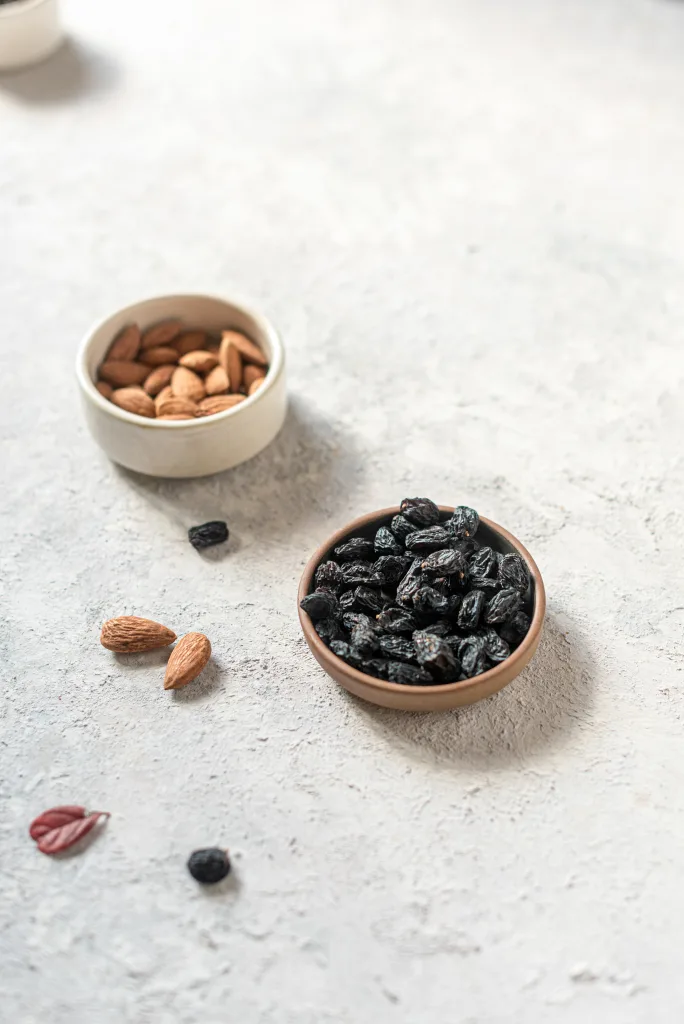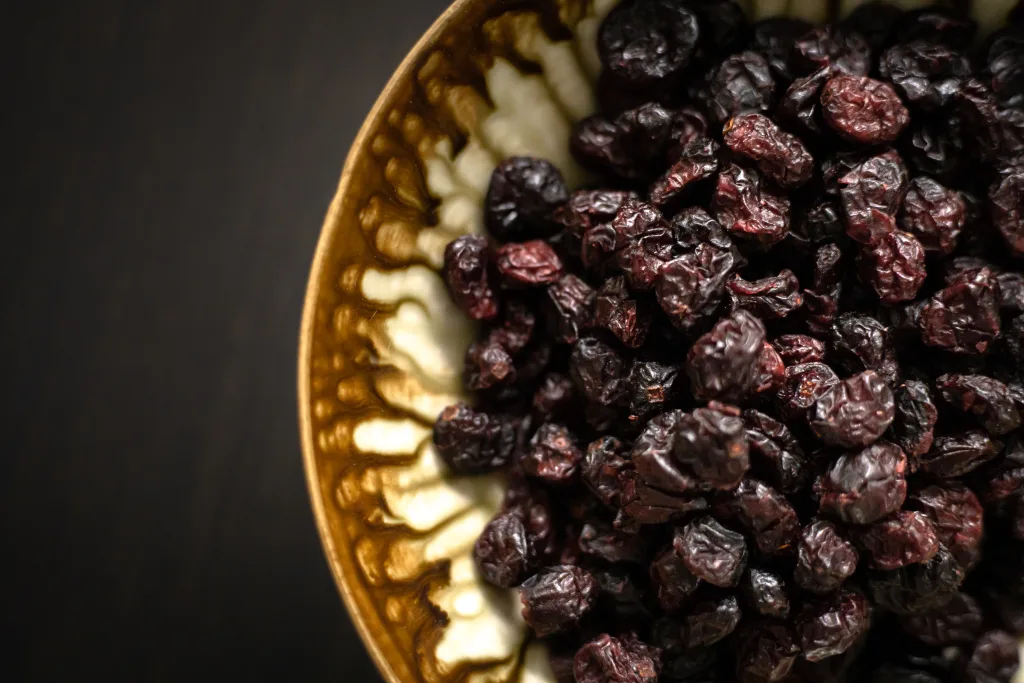Raisins are a great source of nutrition and are used as an ingredient in many dishes, desserts, and snacks. But did you know that raisins can also be beneficial for digestive health? That’s right—consuming 4-5 black raisins daily can help relieve symptoms of constipation.
So why are raisins good for constipation? For starters, raisins are a great source of dietary fiber whch helps to keep your digestive system functioning properly. Raisins are also high in natural sugars, including fructose and glucose, which act as natural laxatives. This means that when you eat raisins, the sugar content helps to promote digestion and ease constipation symptoms.
Raisins also contain compounds that act as prebiotics – this means they stimulate the growth of friendly bacteria in the gut. When tese bacteria grow they help to break down food more efficiently, aiding digestion and relieving constipation.
But how should you consume raisins if you want to reap their benefits? Eating them raw is fine, but if you’re looking to really kickstart your digestion then soaking them overnight is an even better option. Soaking them in water causes them to swell up with fiber and this can create a laxative effect which helps relieve constipation symptoms. You can also add some honey or cinnamon to the soaked raisins for an extra boost of flavor!
In conclusion, consuming 4-5 black raisins daily is beneficial for relieving constipation symptoms due to their high fiber content and natural sugars which act as laxatives. Soaking them overnight before eating will provide an added boost of prebiotic benefits too! Be sure to enjoy your raisins in moderation though—too much can lead to diarrhea instead!
How Eating Raisins Can Help Relieve Constipation
If you are looking for a natural way to relieve constipation, then eating around 4-5 black raisins daily can be very beneficial for you. Raisins are a great source of fiber which helps with digestion and keeps your bowels regular. The fiber in the raisins starts to swell when it comes in contact with water, creating a laxative effect that helps to pass stool more easily. Eating 4-5 raisins daily will help keep your digestive system functioning properly and aid in relieving constipation.

Comparing Prunes and Raisins for Treating Constipation
Prunes are the best choice for constipation relief. They contain a natural laxative called sorbitol, which helps to stimulate the bowels and promote regularity. Prunes also provide fiber, which helps to bulk up stools and make them easier to pass. Prunes are also a good source of vitamin A and potassium, both of which can help with digestion. Raisins are also a good choice as they contain fiber, but they don’t have the same laxative effect that prunes do. So while raisins may help with constipation, they are not as effective as prunes in relieving it.
The Benefits of Eating Raisins as a Laxative
Yes, raisins can be a good laxative. They are high in fibre, which helps to promote healthy digestion and regular bowel movements. When soaked in water, the fibre content of raisins increases and they act as a natural laxative, helping to prevent constipation. The soaked raisins also have the added benefit of being easier to digest than their dry counterparts. Eating them regularly may help keep your digestive system functioning properly and reduce any uncomfortable symptoms associated with constipation. Raisins are also calorie-dense, making them an ideal snack for those looking to increase their daily fibre intake witout overindulging in unhealthy treats.
Using Raisins to Relieve Constipation
Raisins are a great natural remedy for constipation. Eating them on an empty stomach in the morning can be particularly beneficial. To get the most out of raisins, you shuld soak them overnight in a bowl of water. This will make the raisins softer and easier to digest, and it will also help release their natural laxative properties which can help relieve constipation. Additionally, you can add some other healthy ingredients such as diced apples or almonds to your soaked raisins for added fibre and nutrition. Once you have soaked your raisins overnight, simply strain the water, eat your mixture in the morning on an empty stomach and drink plenty of water throughout the day for best results.
How to Relieve Constipation Through Diet
If you are constipated, it can help to eat foods that are high in fiber and contain pleny of fluids. Eating more fiber-rich and water-filled foods may help to relieve constipation. Here are some examples of foods that can help support digestive health:
Fruits like prunes, apples, and pears, which have both soluble and insoluble fiber;
Vegetables like broccoli, spinach, carrots, and winter squash;
Beans and legumes like chickpeas, lentils, black beans, kidney beans, soybeans;
Whole grains like oats, quinoa, barley, bulgur wheat;
Nuts and seeds such as almonds, walnuts, flaxseed;
High-fiber cereals such as bran flakes or granola;
Yogurt with probiotics or live active cultures;
Herbal teas such as chamomile or peppermint tea.
It’s also important to stay hydrated by drinking plenty of water througout the day. Additionally you should limit your intake of foods that can cause constipation such as processed meat products (e.g., hot dogs), cheese and other dairy products with added fats (e.g., cream cheese), fatty snacks (e.g., chips), sugary drinks (e.g., soda), etc.

Source: healthline.com
The Best Dry Fruit to Relieve Constipation
Prunes are the best dry fruit for constipation because they are high in fiber and contain sorbitol, a natural laxative. Prunes have been found to be effective in relieving constipation, as well as providng other health benefits such as reducing inflammation and promoting digestive health. Eating prunes is a great way to get your daily dose of dietary fiber without having to take any special supplements or medications. Other dried fruits that can be beneficial for relieving constipation include dates, figs, apricots, and raisins. All of these fruits contain both soluble and insoluble dietary fibers which help to keep the digestive system running smoothly.
Comparing Black and Green Raisins
The answer to this question really depends on the individual’s preference. Black raisins are generally a bit sweeter than green raisins, while green raisins tend to be firmer and more tart. Both types of raisins are great sources of fiber and antioxidants, so it is really a matter of personal taste. Some people prefer the deep sweetness of black raisins, while others may enjoy the tartness of green raisins. Ultimately, it comes down to what you like best.
Comparing Iron Content in Prunes and Raisins
Raisins have more iron than prunes, with 100 grams of raisins containing 2.6 mg of iron compared to 0.93 mg of iron in 100 grams of prunes. While both are good sources of iron, raisins are the better choice if you’re looking for a higher amount of the mineral. However, it’s important to note that prunes also offer other health benefits such as assisting with digestion and lowering cholesterol levels in the body.
Comparing the Health Benefits of Prunes and Raisins
Prunes and raisins both provide nutritional benefits, but when it comes to which is healthier, prunes come out on top. Prunes are lower in sugar and calories than raisins, and they are also a rich source of vitamin C. Furthermore, prunes pose less risk from pesticides due to the fact that they are pitted before being dried. So if you’re looking for a snack that’s delicious as well as nutritious, prunes may be the way to go!

The Effects of Eating Raisins on Bowel Health
Yes, eating too many raisins can cause bowel problems. Raisins are a good source of soluble fiber, which helps keep your digestive system healthy. However, if you consume too much soluble fiber in the form of raisins, it can lead to gastrointestinal issues such as cramps, gas, bloating and even diarrhea. To prevent these issues from developing, it’s important to monitor how much raisins you’re consuming and be aware of any changes to your digestive health. Eating a balanced diet with plnty of fresh fruits and vegetables along with adequate amounts of water is the best way to ensure your digestive health remains in top shape.
What Not to Do When Experiencing Constipation
When you’re constipated, there are several things you shoud avoid doing in order to help alleviate your symptoms. First and foremost, avoid eating a lot of processed foods, which can be difficult for your body to digest and can lead to constipation. Additionally, avoid skipping meals or snacks throughout the day as going too long without food can contribute to constipation. Also, try not to drink too much alcohol – although it may seem like a good idea at the time, alcohol actually causes dehydration and can lead to constipation due to lack of fluids. Finally, do not rely on laxatives as a way to treat your constipation – although they may provide temporary relief from symptoms, they can be habit-forming and even cause more damage than good if used too often.
Recommended Daily Intake of Raisins
It is generally recommended to consume 30-40 grams of raisins per day, which is equivalent to 8-10 raisins. Eating too many raisins can be bad for your digestive health, as they can limit the body’s ability to absorb othr important nutrients. In addition, since raisins are high in sugar and calories, eating too many of them every day may lead to weight gain. Therefore, it is best to stick with the recommended amount of 8-10 raisins per day.
Benefits of Soaking Raisins Before Eating
Raisins are high in fibre and can act as a natural laxative when soaked in water. Soaking raisins before eating can help to regulate bowel movements, promoting better digestion and relieving constipation. The process of soaking helps to soften the raisins, making them easier to chew and digest, while also helping to release their natural sugars. Additionally, soaking raisins increases their nutritional vaue by activating certain enzymes that make the nutrients more available for absorption. Soaking also helps to reduce any potential toxins or bacteria on the surface of the raisins, making them safer to eat.
The Benefits of Soaking Raisins in Water
Soaking raisins in water can have several benefits. Firstly, it helps make them softer and more pliable, which makes them easier to eat and digest. Additionally, soaking raisins in water releases some of teir natural sugars into the water, making them a better alternative to processed sugars. Furthermore, soaking raisins in water helps to release additional nutrients such as iron, calcium, magnesium and potassium. Lastly, it also helps to reduce the amount of calories consumed since some of the natural sugars are released into the water instead of being absorbed by your body.
The Benefits of Eating Peanut Butter for Constipation
Yes, peanut butter is good for constipation. Peanut butter is a great source of both soluble and insoluble dietary fibers, which can help improve constipation and support regular bowel movements. Two tablespoons (32 grams) of natural peanut butter provides 3 grams of fiber, making up about 10% of your daily recommended fiber intake. Eating foods high in fiber like peanut butter can help to add bulk to your stool, making it easier to pass. Additionally, the healthy fats in peanut butter can also help keep your digestive system running smoothly.
Conclusion
In conclusion, raisins are an excellent source of fiber and are a natural remedy for constipation. They are rich in antioxidants and other beneficial minerals that can help to improve digestion and overall health. Raisins can also be soaked in water overnight to create a laxative effect, providing relief from constipation. Eating 4-5 black raisins daily is a healthy habit that can help to promote regularity and better digestive health.
